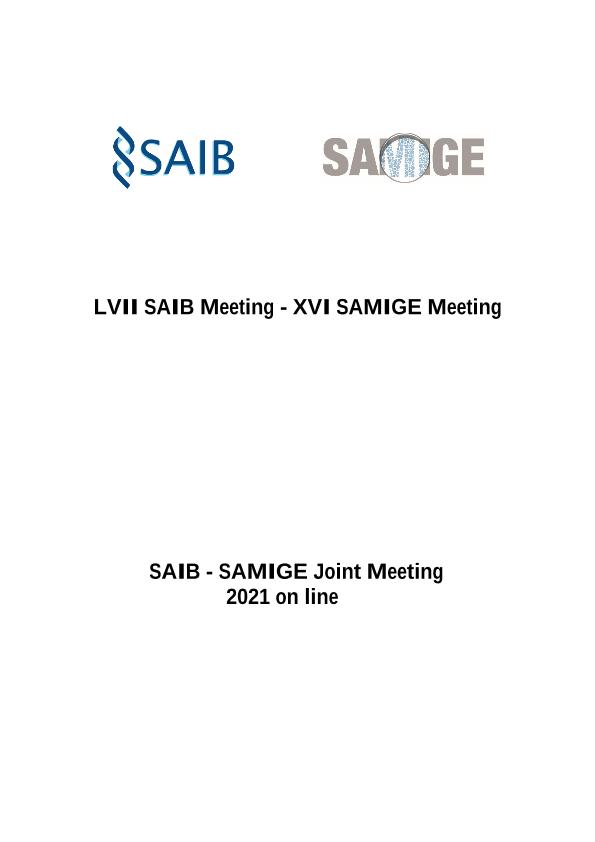Evento
In vitro inhibition assay of copper sulphate as fungicide against White Thread Blight fungal isolates
Dominguez, Facundo Gabriel ; Vereschuk, Manuela Lizz
; Vereschuk, Manuela Lizz ; Zapata, Pedro Dario
; Zapata, Pedro Dario ; Alvarenga, Adriana Elizabet
; Alvarenga, Adriana Elizabet
 ; Vereschuk, Manuela Lizz
; Vereschuk, Manuela Lizz ; Zapata, Pedro Dario
; Zapata, Pedro Dario ; Alvarenga, Adriana Elizabet
; Alvarenga, Adriana Elizabet
Tipo del evento:
Reunión
Nombre del evento:
LVII Reunión Anual Sociedad Argentina de Investigaciones en Bioquímica y Biología Molecular; XVI Reunión Anual de Sociedad Argentina de Microbiología General
Fecha del evento:
01/11/2021
Institución Organizadora:
Sociedad Argentina de Investigación en Bioquímica y Biología Molecular;
Sociedad Argentina de Microbiología General;
Título del Libro:
Libro de resúmenes de la LVII Reunión Anual Sociedad Argentina de Investigaciones en Bioquímica y Biología Molecular y la XVI Reunión Anual de Sociedad Argentina de Microbiología General
Editorial:
Sociedad Argentina de Investigaciones en Bioquímica y Biología Molecular
Idioma:
Español
Clasificación temática:
Resumen
White thread blight is a disease caused by a fungal complex that causes drying of leaves, stems and branches in Yerba mateand tea plants and causes serious losses in the yield of these crops. Conventional synthetic fungicides are largely consideredas the most effective and cost-efficient means for disease management. One of the most used broad-spectrum fungicides forthe control of foliar diseases is copper sulphate pentahydrate. Sensitivity of the pathogens to copper varies greatly, dependingon the product and the fungus. However, to date, no published studies are available on the inhibition/tolerance to coppersulphate concentrations of the white thread blight fungal isolates. This research investigated the grow inhibition of sevenisolates (ACK2, AFE1, ASD4, AKD2, ACJ2, ACB1 and APC1) associated with white thread blight disease by the poisonedfood method. Czapek agar medium was supplemented with copper sulphate pentahydrate (CuSO4.5H2O) at concentrations of100ppm, 500ppm, 1000ppm and 5000ppm. Twenty milliliters of each sterile medium were dispensed into Petri dishes andinoculated with a 5mm disc cut from the periphery of a 7 days-old culture. Each isolate was inoculated onto two plates andincubated at 28°C. Mycelial growth of the isolates was determined by linear measurements of colony diameters with anelectronic caliper at four intervals. To determine fungicide or fungistatic effect the discs which concentrations that completelyinhibited growth were inoculated in Potato Dextrose Agar (PDA) medium. Three isolates (AKD2, ACB1, AFE1) showed amaximum inhibition of mycelial growth at 500ppm. Additionally, two isolates (ACK2, ACJ2) were inhibited at a concentrationof 1000 ppm. Maximum effect of inhibition of growth was observed at the highest concentration at 5000 ppm. Infungicide/fungistatic assay we verified that at 1000 ppm copper sulphate acts as a fungistatic, inhibiting the development ofthe fungus but without causing its total elimination. These results suggest that white thread blight pathogens are sensitive tocopper sulphate-based fungicides.
Palabras clave:
Fungicides
,
Growth inhibition
,
White thread blight disease
Archivos asociados
Licencia
Identificadores
Colecciones
Eventos(PROIMI)
Eventos de PLANTA PILOTO DE PROC.IND.MICROBIOLOGICOS (I)
Eventos de PLANTA PILOTO DE PROC.IND.MICROBIOLOGICOS (I)
Citación
In vitro inhibition assay of copper sulphate as fungicide against White Thread Blight fungal isolates; LVII Reunión Anual Sociedad Argentina de Investigaciones en Bioquímica y Biología Molecular; XVI Reunión Anual de Sociedad Argentina de Microbiología General; Rosario; Argentina; 2021; 99-99
Compartir



